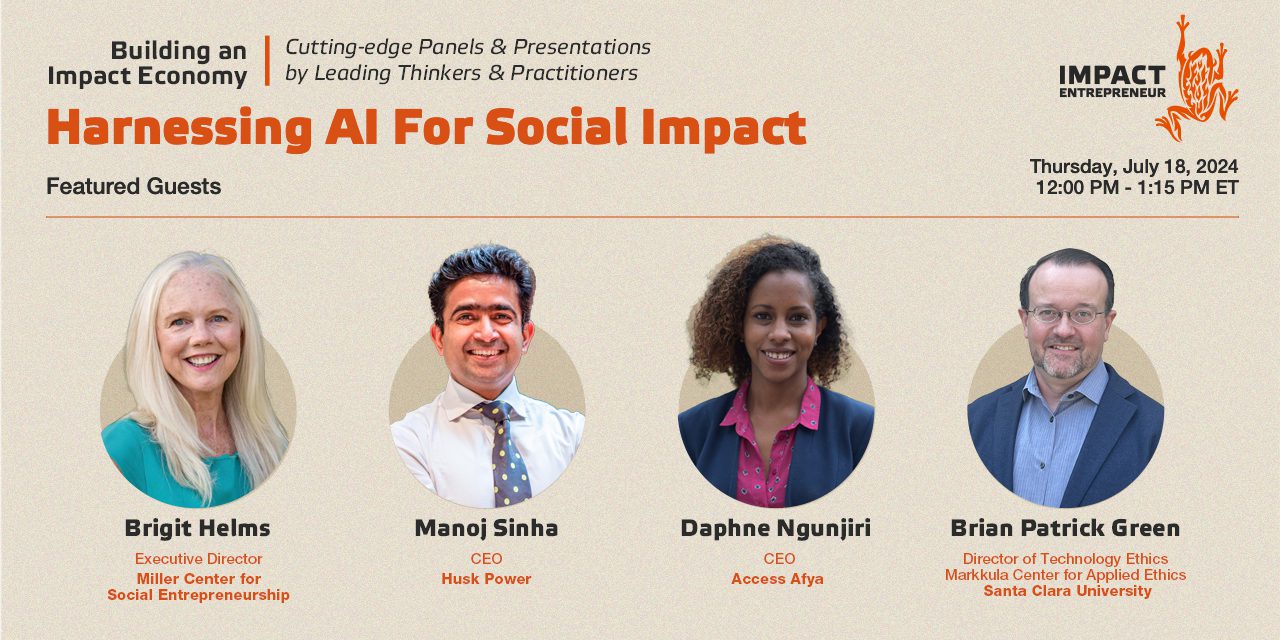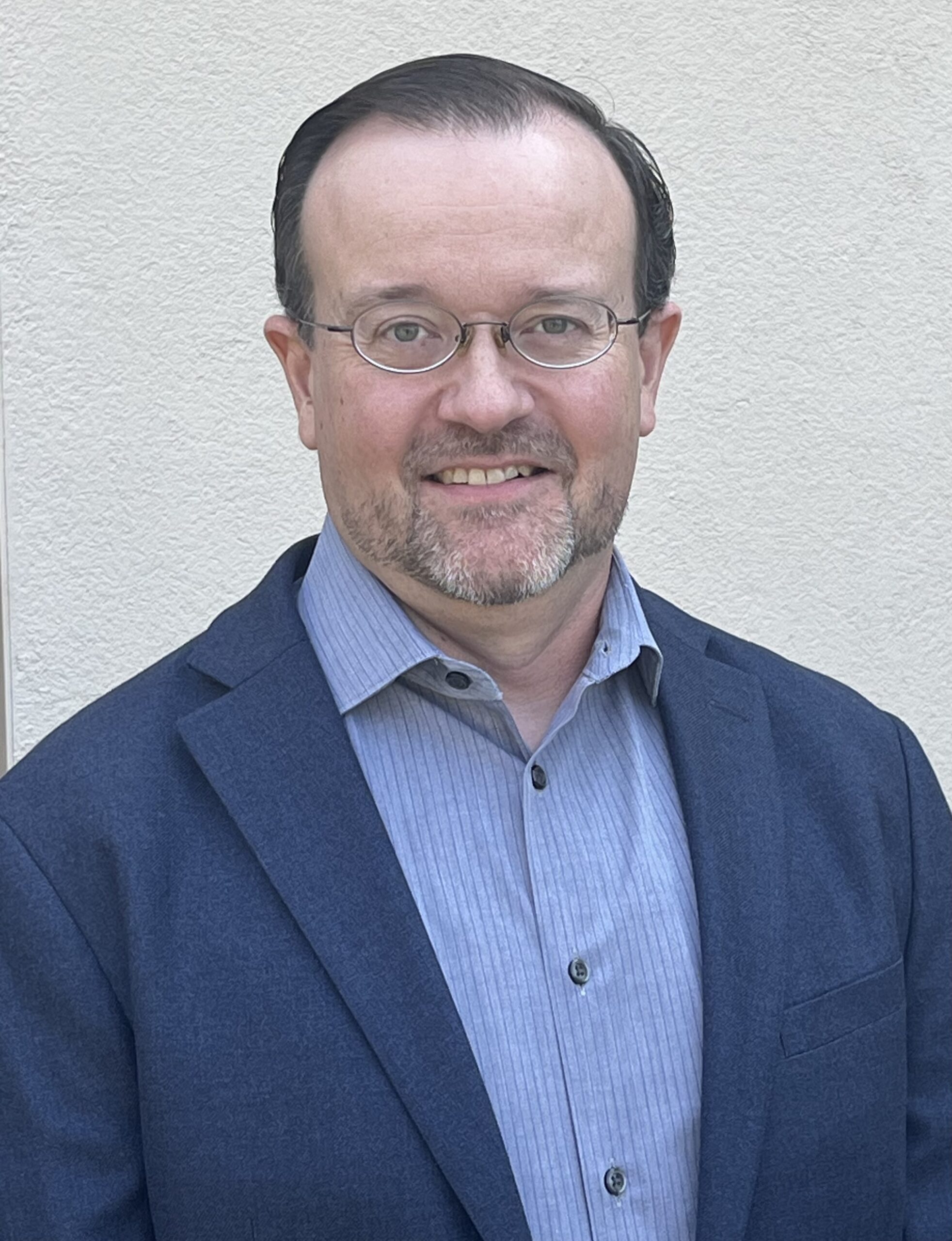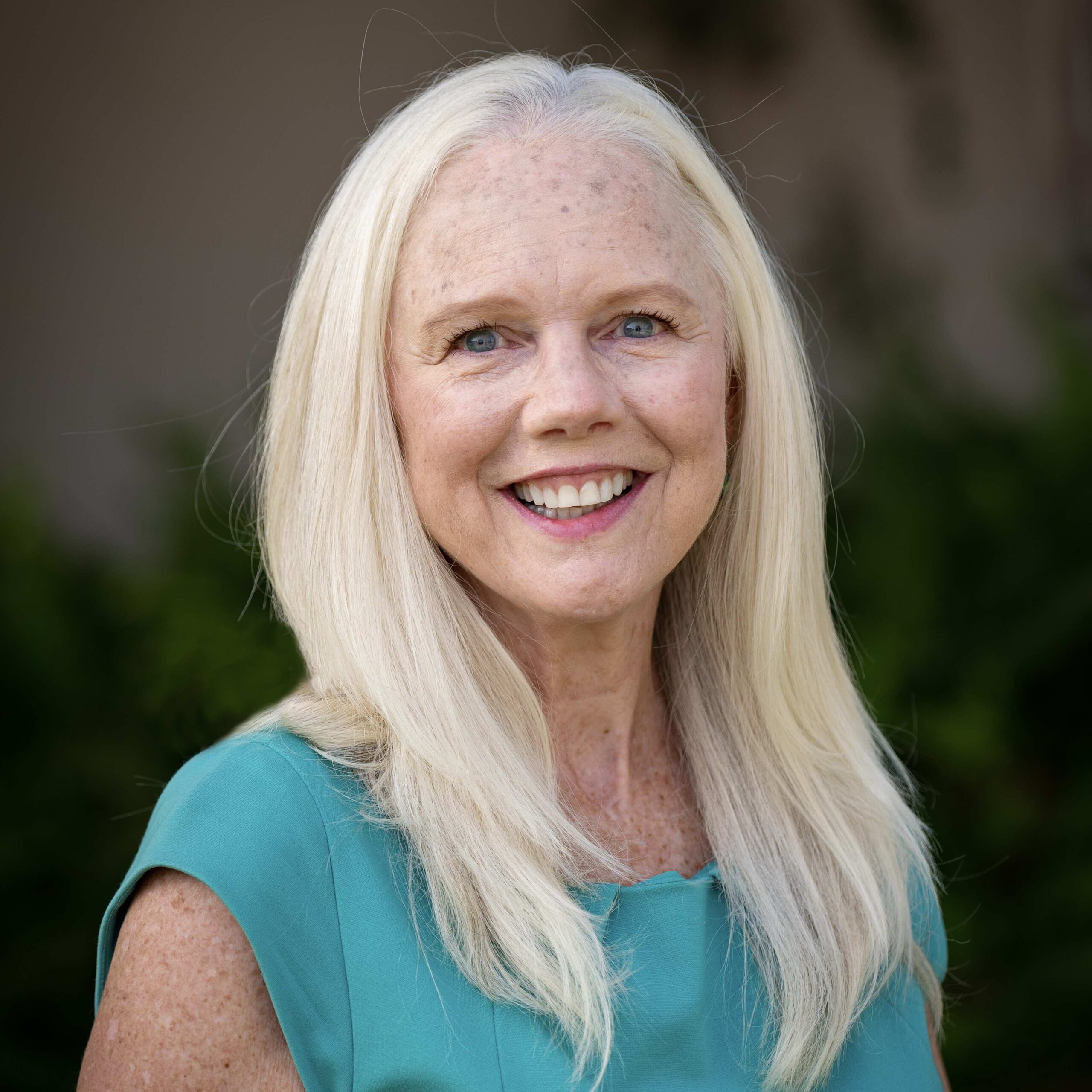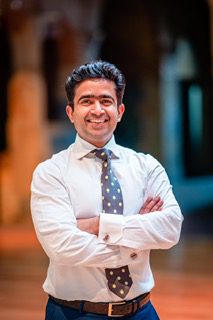Unplastifying the Future
Tati Besada’s mission to restore our oceans

Harnessing AI For Social Impact Webinar Program
In an era marked by unprecedented technological advancement, the intersection of artificial intelligence (AI) and social impact presents extraordinary opportunities for positive change. This webinar, part of Impact Entrepreneur’s Building an Impact Economy Webinar Series, explores the technology’s potential for good, as well as the ethical challenges and risks associated with it, inspired by the insights shared by Brigit Helms in her compelling article.
Brigit, along with a distinguished panel of social entrepreneurs and a technology ethicist, will navigate through the real-world applications and the broader implications of AI in today’s social impact landscape. The dialogue seeks to advance an understanding of how AI-driven solutions are improving impact, while underscoring the importance of responsible implementation and ongoing ethical scrutiny. This webinar is an opportunity for participants to garner actionable insights on the application of AI to business operations to achieve greater social-economic goals, thereby playing a pivotal role in accelerating the momentum towards an impact economy.
Topics to be covered include:

Brian Patrick Green, Ph.D., is the director of technology ethics at the Markkula Center for Applied Ethics at Santa Clara University and teaches AI ethics in Santa Clara’s Graduate School of Engineering. His work focuses on ethical issues with AI, tech companies, risky emerging technologies, space exploration, and the relationship of technology and religion. He is author, co-author, or co-editor of six books, and has worked on technology ethics with the World Economic Forum, the Vatican, and technology companies including Microsoft, Salesforce, and IBM. Green has been cited in media ranging from The Atlantic to The Wall Street Journal.

Brigit Helms is Executive Director at the Miller Center for Social Entrepreneurship, the premier university-based social enterprise accelerator dedicated to eliminating poverty. For 30 years, Brigit has created and delivered solutions to social and environmental challenges in 45 countries across Africa, Asia, and Latin America, in both the private and public sectors. As vice president for the global development company, Development Alternatives, Brigit led a team of experts in economic growth, governance, environment, and results management to help design and implement solutions to complex development problems around the world. Previously, she led the Multilateral Investment Fund (now IDB Invest), the innovation lab of the Inter-American Development Bank that invests $85 million per year in social enterprises across Latin America and the Caribbean. At McKinsey, she helped build a global financial inclusion practice, providing mobile financial services for the under-served, and supporting the development of a smart card-based agent banking network. Brigit spent around 14 years with the World Bank Group, including launching banking, agriculture, and forestry programs to benefit small and medium enterprises in Indonesia through its International Finance Corp (IFC). She also served as sector leader for IFC’s East Asia and the Pacific region, leading the Access to Finance program from her base in Cambodia. She was a founding member of the Consultative Group to Assist the Poor (CGAP), a global center of excellence for financial inclusion, where she supported microfinance institutions and their ecosystems across the globe.

Dr. Daphne Ngunjiri is the CEO of Access Afya, where she spearheads the mission to deliver affordable, high-quality healthcare to underserved communities in Kenya. A seasoned healthcare leader with over 15 years of combined medical and management experience, she holds both an MBChB from the University of Nairobi and an MBA in Healthcare Management and Policy from Strathmore Business School. Dr. Ngunjiri believes passionately in the power of healthcare systems, data, and analytics to revolutionize operational efficiency and clinical outcomes.

Manoj Sinha is CEO of Husk Power and one of TIME’s 100 Most Influential Climate Leaders in Business. In 2008, he pioneered the minigrid industry to eradicate energy poverty, and has since built Husk into the leading clean energy company serving rural Africa and Asia. Husk owns and operates the world’s largest fleet of minigrids. Under Manoj’s leadership, Husk recently raised $100 million to electrify 1,400 new communities. Manoj is a board member of CLEAN, India’s decentralized renewable energy trade association. He also received a Lifetime Achievement Award from the Africa Solar Industry Association.

Laurie Lane-Zucker is Founder and CEO of Impact Entrepreneur, PBC, an impact economy business that hosts the Impact Entrepreneur Network — a large, global network of “systems-minded” entrepreneurs, investors, and scholars of social and environmental innovation — and editor and publisher of Impact Entrepreneur, a digital magazine covering the emerging Impact Economy. For over 30 years, Laurie has been a “pioneer” (Forbes) and recognized leader in sustainability, social enterprise, and impact investing. Laurie was the founding Executive Director of the international environmental organization, Orion Society, which publishes the celebrated Orion Magazine, as well as the founder of a global sustainability think-tank, the Triad Institute, and Hotfrog, a Founding B Corporation, GIIRS Pioneer Company, and the first company ever to complete an equity transaction on an impact investment exchange. Laurie is the bestselling and multiple award-winning publisher and editor of books and magazines on sustainability and social impact — having worked with such acclaimed authors as Wendell Berry, Barry Lopez, Terry Tempest Williams, and David James Duncan — and the author of numerous articles on entrepreneurship and impact investing. Laurie is contributing author to the recently published academic textbook from World Scientific, Sustainability: Business and Investment Implications (2023).
At Impact Entrepreneur, we champion fearless, independent journalism and education, spotlighting the inspiring changemakers building the Impact Economy. Diversity, equity, sustainability, and democracy face unprecedented threats from misinformation, powerful interests, and systemic inequities.
We believe a sustainable and equitable future is possible—but we can't achieve it without your help. Our independent voice depends entirely on support from changemakers like you.
Please step up today. Your donation—no matter the size—ensures we continue delivering impactful journalism and education that push boundaries and hold power accountable.
Join us in protecting what truly matters. It only takes a minute to make a real difference.